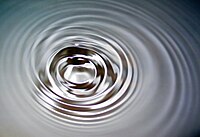
Photo from wikipedia
Experimental or numerical analysis of the response of ships and other floating structures starts with correct environmental modelling. The capabilities of numerical tools are rapidly expanding, but presently the evaluation… Click to show full abstract
Experimental or numerical analysis of the response of ships and other floating structures starts with correct environmental modelling. The capabilities of numerical tools are rapidly expanding, but presently the evaluation of extreme events in waves (such as slamming, green water, air-gap exceedance) still requires a combination of experiments and different levels of numerical tools. The present paper describes recent efforts within the Maritime Research Institute Netherlands (MARIN) to improve experimental and numerical wave modelling and especially their combination. The ultimate objective is to be able to reproduce any wave condition from a basin or from sea in numerical tools and vice versa, including a sound treatment of basin effects, numerical effects and statistical variability. The aspects that are of importance in both types of wave modelling are first introduced, after which a number of examples of recent projects is discussed. It can be concluded that important steps were made towards linking experimental and numerical wave modelling, but there are some challenges common to all wave reproductions. Some future planned studies focussing on how to deal with them are discussed as well.
Journal Title: Journal of Marine Science and Engineering
Year Published: 2020
Link to full text (if available)
Share on Social Media: Sign Up to like & get
recommendations!